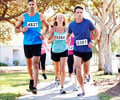Running to escape from negative experiences rather than to escape to positive ones, according to researchers, may lead to exercise reliance among runners.
- Running has several physical and mental health benefits
- However, running to avoid or forget unpleasant or boring things can lead to exercise dependence
- This exercise dependence corrodes the potential well-being gains associated with regular exercise
Running to Explore or Escape
“Escapism is an everyday phenomenon among humans, but little is known regarding its motivational underpinnings, how it affects experiences, and the psychological outcomes from it,” said Dr. Frode Stenseng of the Norwegian University of Science and Technology, lead author of the paper. “Escapism is often defined as ‘an activity, a form of entertainment, etc. that helps you avoid or forget unpleasant or boring things’. In other words, many of our everyday activities may be interpreted as escapism,” said Stenseng. “The psychological reward from escapism is reduced self-awareness, less rumination, and a relief from one’s most pressing, or stressing, thoughts and emotions.”“These two forms of escapism are stemming from two different mindsets, to promote a positive mood, or prevent a negative mood,” said Stenseng.
Escapist hobbies for self-expansion have more favorable results, but they also have more long-term benefits. Self-suppression, on the other hand, tends to suppress both happy and negative feelings and leads to avoidance.
Exercise Dependency is Connected with Self-Suppression
The team recruited 227 recreational runners, half of whom were men and half of whom were women, with significantly disparate running habits. They were asked to complete questionnaires that investigated three different aspects of escapism and exercise dependence: an escapism scale that measured preference for self-expansion or self-suppression, an exercise dependence scale, and satisfaction with life scale that measured the participants' subjective well-being.The researchers discovered that there was very little overlap between runners who chose self-expansion modes of escapism and runners who favoured self-suppression kinds of escapism. Self-expansion was associated with increased happiness, whereas self-suppression was associated with decreased happiness. Both self-suppression and self-expansion were connected to exercise reliance, but self-suppression was significantly stronger. Neither escapism style was associated with age, gender, or the amount of time spent running, but both had an impact on the association between well-being and exercise reliance. Whether or not a person met the requirements for exercise dependence, a preference for self-expansion would still be associated with a more positive sense of self.
Although exercise reliance corrodes the potential well-being gains from exercise, it appears that experiencing reduced well-being is both a cause and an effect of exercise dependency: the dependency may be driven by poorer well-being while also fostering it.
“More studies using longitudinal research designs are necessary to unravel more of the motivational dynamics and outcomes in escapism,” said Stenseng. “But these findings may enlighten people in understanding their motivation and be used for therapeutical reasons for individuals striving with a maladaptive engagement in their activity.”
















